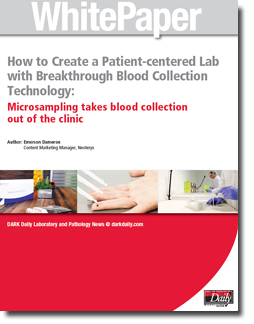Many of the newer patient-centered technologies are those based on the concept of remote patient monitoring (RPM).
RPM is proving so beneficial for patients and healthcare professionals, it has touched off a new wave of innovation—that of microsampling blood collection technology.
More technicians, and the clinicians who rely upon them, are adopting patient-centric technologies to improve the quality of patient care and thus support enhanced clinical outcomes. Included in this proliferation of new technologies are those based on concept of remote blood sampling using microsampling technology.
Remote patient monitoring through microsampling blood collection makes many aspects of healthcare less invasive and intrusive for patients, with the ability to participate in one’s care from the comfort and privacy of his or her home. Expenses associated with healthcare travel and long wait times are minimized, patients take more control over their treatment, and are often happier than those who need to travel to have illnesses and chronic conditions monitored.
Dark Daily is pleased to offer a recently published free White Paper that shares with laboratory professionals valuable and informative insights on how the field-changing technology of microsampling can answer the challenges of changing remote patient requirements.

“How to Create a Patient-centered Lab with Breakthrough Blood Collection Technology: How to Save Time and Increase Profitability by Using Modular Technology to Improve Access Features, Automate Reporting & Expand Efficiencies” details the ways in which new microsampling blood collection methods facilitate a more patient-centric lab, and provide a user-friendly alternative to older, more intrusive or cumbersome methods.
In addition, this complimentary White Paper provides labs with a practical, step-by-step roadmap to new microsampling technology adoption, deployment, and success.
At DarkDaily.com, readers can access free publications on a variety of topics tailored specifically to the needs of laboratory administrators, lab managers, pathologists, and lab industry consultants.



